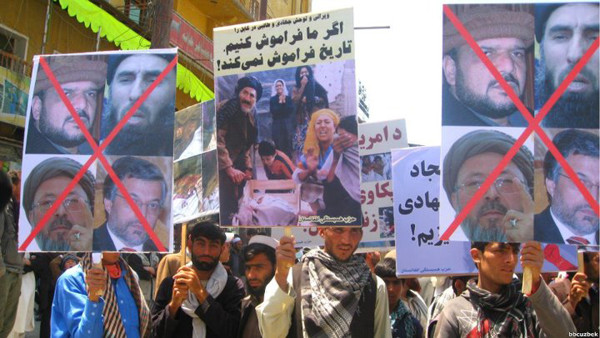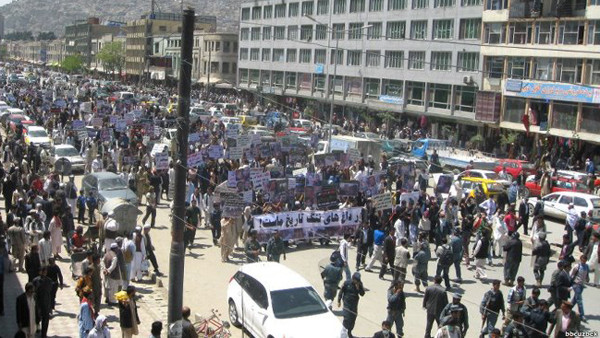By Emma Graham-Harrison

April 30, 2012: The banner reads: 28th and 27th April are two shameful stains in our history! Hundreds gathered in Kabul to condemn these dark days. (Photo: BBC Persian)
More Photos
Afghanistan has suspended a political party for the first time since the fall of the Taliban in 2001, a ban diplomats and activists say is a worrying sign freedoms in the country could suffer as western troops leave, taking funds and attention with them.
The Solidarity Party angered powerful politicians with a demonstration in late April accusing a swathe of Afghan leaders, former leaders and commanders of committing war crimes over the last three decades of conflict, and demanding they be brought to justice.
A small left-wing organisation, it barely registers as a force in a national political life dominated by patronage networks and heavyweight power brokers; it boycotted the last two elections to the lower house of parliament and has just one senator in the upper house. But its suspension sends a chilling message about shrinking government tolerance for dissent.
"It's worrying that a political party has been suspended. If this is the start of a trend, it would give rise to great concern," said one senior western diplomat, who asked not to be named.
Freedom of speech and association have been one of the country's human rights success stories since 2001, so seeing them under attack is particularly disturbing, said Heather Barr, Afghanistan researcher at Human Rights Watch.
"This is the first time the Afghan government has attacked a political party simply for expressing views," Barr said.
"As the international community heads for the exits in Afghanistan, the suspension of the Solidarity Party is one of a number of worrying signs that the space for free speech in Afghanistan may be starting to close. A crackdown on free speech would be a disaster for human rights in a country where rights are already in great peril."
The party courted controversy with the march by holding it on a national holiday commemorating the victory of mujahideen fighters over Soviet troops, and burning pictures in the street of the men they consider war criminals.
They named leaders from all sides of the conflicts that have raged since the late 1970s, some of whom are heroes in part of Afghanistan, or still in government or positions of power.
"[We] demand the prosecution of the criminal leaders," the group said in a statement issued on the day of the march. "Our party is committed to breaking the atmosphere of fear and dread."
In early May, the party was summoned by the upper house of parliament to answer questions about the protest, said Hafiz Rasiq, organiser and member of the leadership.
And then in early June, they received a letter informing it that, at the request of a Senate committee, its activities had been suspended to allow the attorney general to investigate the demonstration.
The letter said the party had "violated article 59 of the constitution", which stipulates that no one can misuse their rights and freedoms to damage national sovereignty or unity.
The Solidarity Party counter that they respect honest commanders and politicians, but were giving voice to the legitimate wishes of many Afghans to see people face prosecution for bringing death, poverty and misery to their families.
"The aim of our party is peace, democracy and social justice," said Rasiq.
"The martyrs who were killed during the jihad times, many of their families still live in very impoverished conditions, their sons are just selling fruit, or washing cars, while those who try to use the name of jihad have huge fortunes, dozens of bullet-proof cars."
The ban comes shortly after the committee to protect journalists warned that several Afghan media organisations could face criminal charges over their reporting on an alleged bribery scandal, and said the profession was under "political and economic pressure".
"There is cause for unease for the future of Afghan's media, as for much else in Afghanistan as NATO forces prepare for withdrawal," wrote Asia programme coordinator Bob Dietz in a blog.
Outlets, including the respected Pajhwok news agency, have been referred by the government's Media Monitoring Commission to the attorney general's office, he added.
Barr, from Human Rights Watch, said that researchers have also said their access to government figures and information has been curbed.
"There have been a growing number of worrying incidents of the government maligning or even seeking to prosecute journalists, blocking access to information, and obstructing reporting and research," she said. "None of this bodes well for human rights in Afghanistan post-2014."
The Solidarity Party is gearing up for a fight. It hopes the suspension will be overturned once the investigation is complete, but if not members say they are preparing to continue with political activities despite the possible consequences.
It has had strong support from Afghan civil society, Rasiq said, and hopes for more political support from the international community on a case that analysts say has far-reaching implications.
Thomas Ruttig, a director of the Afghanistan Analysts Network, said: "How this case will be handled by the Afghan authorities will show how much the rule of law in Afghanistan has evolved where, according to President Karzai's speech at the NATO summit in Chicago, the 'foundations of a vibrant democracy' have already been laid."
Additional reporting by Mokhtar Amiri

April 30, 2012: Photos of infamous warlords like Gulbuddin Hekmatyar, Qaseem Faheem, Karim Khalili and Qanooni were defaced. (Photo: BBC Persian)
More Photos

April 30, 2012: Hundreds took to streets with chants of "Death to warlords" and cursed warlords Gulbuddin, Sayyaf, Khalili, Fahim and others. (Photo: BBC Persian)
More Photos



